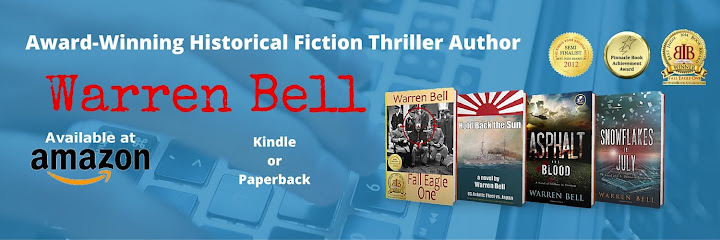My
current writing project, Asphalt and
Blood, has reached the editing stage. The book follows the adventures of
U.S. Navy Seabees during the 1968 Battle For Hue City. For the uninitiated,
Seabees is a nickname for the famed Navy Construction Battalions formed during
World War II to build advanced bases in the Pacific islands and for the war in
Europe. Without the airfields, port facilities, and support facilities they
constructed, neither the Pacific island campaigns nor the amphibious invasions
in Europe would have been possible. On Iwo Jima, Marines put up a sign that
read, “And when we reach the isles of Japan, with our hats at a jaunty tilt,
We’ll enter the city of Tokyo, On roads that the Seabees built.” Seabees proved
equally as crucial to the war efforts in Korea, Vietnam, Desert Storm, Iraq,
and Afghanistan.
My
wife and primary editor, Annette, is pouring over the work with an eagle
eye. Several chapters in, her most
frequent criticism to date is that I have used too much of what she calls,
“Seabee-ese.” In other words, she
believes that, in striving for accuracy in conversations between my characters,
I have used too many acronyms, technical terms, and slang that only a fellow
Seabee can understand. Going back over my text, I can see that she is right.
Here
are some examples. In describing earthmovers, I used the standard designations,
TD-6 and TS-24, etc. The TD stands for, “tractor-dozer, ” TS for
“tractor-scraper.” Every Seabee would recognize this immediately. Likewise, all
Seabees would understand the designation of characters by their position in the
battalion organization, such as “ALPHA-6” for the company commander of A
Company, the horizontal construction force, or “S-3” for the Operations Officer. While this is actually the way that Seabees
talk, use of such terms without explanation or in narrative passages can be
very confusing to other readers.
An
author must continually keep the target audience in mind. My target audience
for Asphalt and Blood is not only
Seabees everywhere and of all ages but also the general military fiction
readers of my first two works, Fall Eagle One and Hold Back the Sun. Sometimes, precise technical accuracy must
give way to the ability of general readership to quickly grasp the story. The key editing question, “Does this move the
story forward,” must be kept continually in mind.
In
making my first pass through the manuscript with Annette’s comments in hand,
“TD-6” is becoming “bulldozer” or “dozer.” “ALPHA-6” in narrative will be replaced by the
character’s name. Organization positions
used in dialog must be carefully but succinctly explained. When I worked in the
Pentagon, all documents had to be subjected to what was called, “the idiot
test.” The question, “could anyone from the general population be able to
understand what the document was trying to convey” had to receive a positive
answer. I’m sure that a new name applies now because of “political
correctness,” but the gist remains the same. If readers become bogged down with
confusion over words, they will likely lose interest and stop reading. The
author has failed.
All
this brings up another related question, “Can an author be too close to his/her
subject?” When the author is closely and emotionally invested in the story,
especially when writing about personal experiences, the tendency to make it
“just like it actually happened” can be very powerful. When writing fiction,
these urges must be subordinated to clearly relating the story. The reader must
be stimulated to anticipate every page turn to learn what comes next.
Re-writing
and editing takes discipline that every author must learn to become successful.
In most cases, the use of a professional editor may be necessary. I know that Fall Eagle One, my debut novel, is
immeasurably better because of a professional editor. It’s becoming clear that Asphalt and Blood could benefit from
similar treatment. I still have a lot of work to do.
Note: Warren Bell is a historical fiction author
with two novels for sale either for Kindle or in paperback from
Amazon.com. Both are set during WWII, with Fall Eagle One taking
place in Europe, and Hold Back the Sun set in the war in the
Pacific.











